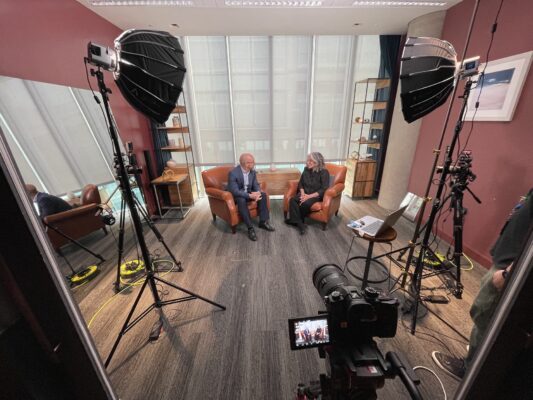
This year, on the 11th anniversary of Global Accessibility Awareness Day, I lived the G in GAAD by spending GAAD week in London, with a side trip to Dublin. Being immersed in the digital accessibility community in the UK was a treat.
And after working in the digital accessibility space for 27 years, GAAD 2023 outside the United States was an energy boost I hadn’t realized I needed.
My annual GAAD writing this year also had an international bent. Thanks to 35 digital accessibility champions around the world, I updated my Digital Accessibility Global Law and Policy page (now available in the drop down menu from the Laws and Legal Update tab on the main site menu).
This article shares a taste of my 2023 GAAD. I don’t usually write about my speaking events or accessibility gatherings after they happen, and I’ve been thinking about why I’m moved to write this article. I think it comes down to wanting a record of last month’s events that doesn’t fade away in a social media feed. But why?
Being immersed in the accessibility community outside the US during GAAD 2023 was exhilarating. I hope that sharing the experience here, coupled with the new LFLegal global law and policy page, will remind others of the community that extends far beyond our individual roles. Will remind us all that accessibility (#a11y) is more than an industry.
If you work in accessibility, whether you traveled or sat at your desk on May 18, 2023, you too are part of that global community. A community full of commitment, passion, and a desire for a truly inclusive, ethical, digital world where no one is excluded.
I’m full of gratitude for each experience described below and most of all for the people who made these experiences possible. My only question? Where should I spend GAAD in 2024!
- Joining Microsoft and legal industry accessibility leaders
- The Google Accessibility Discovery Centre welcomes exploration
- TetraLogical team learns about the US legal space
- Meeting with Dublin accessibility and digital inclusion leaders
- Two Teach Access board members (finally) meet in London
- More accessibility community, colleagues and friends
Joining Microsoft and legal industry accessibility leaders
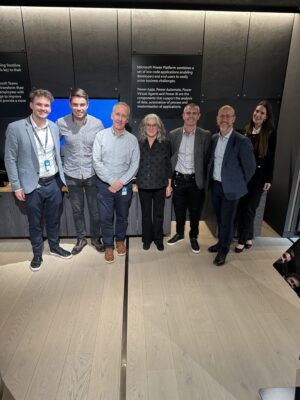 A highlight of my London visit was spending GAAD at Microsoft UK with Hector Minto, Microsoft’s lead accessibility evangelist, and his team and speaking at Microsoft’s Legal Industry Accessibility Roundtable.
A highlight of my London visit was spending GAAD at Microsoft UK with Hector Minto, Microsoft’s lead accessibility evangelist, and his team and speaking at Microsoft’s Legal Industry Accessibility Roundtable.
It was encouraging to be in conversation with people from UK-based law firms who care about digital inclusion. People who care about making their law firms accessible to employees with disabilities. And care about delivering accessibility to their clients.
I’d love to be in a gathering like this in the United States!
The issues we talked about in the Legal Industry Roundtable are relevant in the US and in other countries as well. For example,
- digital accessibility makes an inclusive law firm possible by allowing firms to attract and retain employees (lawyers and others) with disabilities. There is no DEI (Diversity, Equity, and Inclusion) without disability.
- Because accessibility is privacy and security for people with disabilities, law firm attention to privacy and security demands accessible workplace tools.
- Digital accessibility is essential to law firm ethics because client communication is essential to ethical lawyering. Accessible documents and video conferencing platforms are just two examples of the types of tools and content that must be accessible for inclusive client communication.
In addition to talking about why law firms should be accessible to employees and deliver accessibility to clients, we talked about how to make that happen. Again, the conversation in London has application beyond the UK.
Engaging and learning from people with disabilities, as in all sectors, is key. Starting small and celebrating successes encourages forward progress. Focusing on accommodation (referred to as “adjustment” in the UK’s Equality Act) makes a diverse workforce as well as an accessible and welcoming application process possible.
These are just some of the issues discussed at the roundtable. It was also great to learn from Hector MInto (who I had long felt connected with but finally met in person) about Microsoft’s continued leadership in bringing accessibility to the world, including law firms.
When people ask me if the accessibility landscape has changed since I helped negotiate the first web accessibility agreement in 2000, I usually start my answer with one thing: we certainly did not have a company like Microsoft we could point to when explaining the value of accessibility to organizations new to the issue. Now we have Microsoft and others too.
Microsoft embraces accessibility, talks publicly about the why and how of accessibility commitments, shares resources, and has accessibility roles across the company. The company spotlights disabled employees, encourages disability self-identification, and talks about disability inclusion and accessibility as sources of innovation.
Microsoft works to build accessibility into its products and services and helps its vendors and customers do the same. (And maybe as important, it states publicly that the company is on a journey that is not over yet.)
If you haven’t yet, the Microsoft accessibility portal is well worth a visit, as is the recording of the 2023 Microsoft Ability Summit.
The image at the top of this article shows Hector and me in a Microsoft studio room to chat about accessibility for a short Microsoft internal video. The image with this section shows Hector, me, and the team that organized the Legal Industry Roundtable. Special shout out to Miriam Lloyd and Jack Nicholls for all their work in making it happen!
Back to topThe Google Accessibility Discovery Centre welcomes exploration
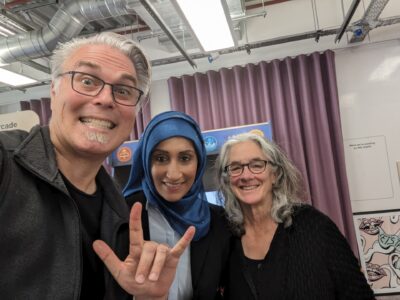 Thank you Christopher Patnoe, Head of Accessibility and Disability Inclusion, Europe, Middle East, Africa at Google, for inviting me to visit Google’s Accessibility Discovery Centre in London. I made the visit with friend and accessibility champion Sam Latif who leads Proctor & Gamble’s accessibility efforts.
Thank you Christopher Patnoe, Head of Accessibility and Disability Inclusion, Europe, Middle East, Africa at Google, for inviting me to visit Google’s Accessibility Discovery Centre in London. I made the visit with friend and accessibility champion Sam Latif who leads Proctor & Gamble’s accessibility efforts.
In the image with this section, Christopher, Sam, and I are smiling and Christopher is making the American sign language sign for love. I was glad he was in London during our visit. The next week, Christopher and other Google friends and colleagues were headed to Kenya to participate in the Inclusive Africa conference, organized by the wonderful NGO InABLE. Another important piece of the global accessibility community.
The Google Accessibility Discovery Centre is a gathering space to learn about how disabled people use technology. It is a place for the disability community within and outside Google to share expertise, and to help Google on its journey as a leader in the accessibility space. Here’s a great video about the Centre.
It was fun to get the official Centre tour by Christopher, and great to be there with Sam, who is doing pioneering accessibility work at P&G. Sam and her family welcomed me with open arms when I stayed with them on my first night in London. When they suggested a walk after dinner little did I suspect it would be to Windsor Castle!
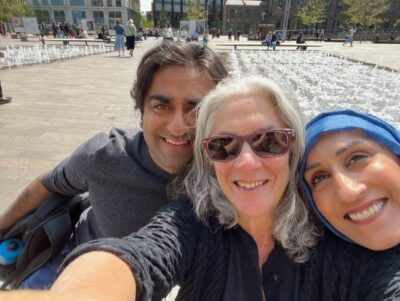
And after our time at Google, Sam and her brother Adi Latif, also in the accessibility community as a consultant on the AbilityNet Digital Accessibility Services Team, spent some time showing me the London canals that I didn’t know existed. This image shows the three of us smiling in the sunshine.
TetraLogical team learns about the US legal space
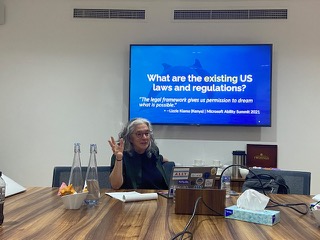 I was lucky that my visit to London coincided with the TetraLogical all-team meeting. I joined one of my favorite digital accessibility consultancies to talk about what’s happening in the US digital accessibility legal space.
I was lucky that my visit to London coincided with the TetraLogical all-team meeting. I joined one of my favorite digital accessibility consultancies to talk about what’s happening in the US digital accessibility legal space.
With possible new legislation and regulations on the US horizon and plenty of law suits and negotiations happening, there was lots to talk about! Based in the UK, TetraLogical’s many clients operate globally, so the US legal landscape matters. But one (of many) reasons I like TetraLogical is that the consultancy doesn’t lead with legal requirements.
They believe, as do I, that accessibility initiatives work best when law and legal compliance are not the main drivers. As I often say, law in accessibility programs is like the salt in a cookie – you need it to make a sweet cookie, but too much wrecks the batter.
A special thank you to TetraLogical directors Léonie Watson and Henny Swan, long time friends and colleagues in accessibility, for letting me be part of their GAAD week gathering.
Back to topMeeting with Dublin accessibility and digital inclusion leaders
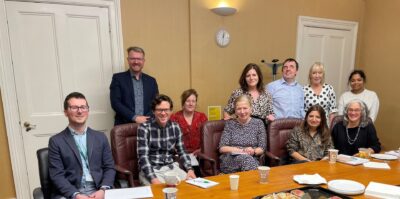
My travel partner in London was my friend Shilpi Kapoor, founder and CEO of two highly regarded accessibility companies, BarrierBreak (based in India) and 247 Accessible Documents (based in Singapore). Both companies operate globally, yet another reminder during my GAAD UK experience that accessibility is global.
In addition to five packed days in London, Shilpi and I went to Dublin for a short visit. We received a warm welcome from our friend and accessibility champion Donál Rice.
Donál is the Senior Standards & Monitoring Officer at the Centre for Excellence in Universal Design (CEUD) and Standards & Monitoring, a program of the National Disability Authority of Ireland. The image with this section shows Donál’s team, some invited guests, and Shilpi and me at the meeting he set up while we were there.
Shilpi and I shared our experiences in the accessibility space and learned about the important work Donál and his team are doing to make sure Ireland is ready for full implementation of the European Accessibility Act (EAA).
I already knew that Shilpi’s accessibility companies have much to offer organizations across the globe. Our conversation also made me think about whether my experience implementing accessibility laws in the United States for a quarter century with collaboration instead of lawsuits has something to offer other countries as they look to implement the EAA and other accessibility laws and policies. I welcome ideas on that.
Two Teach Access board members (finally) meet in London
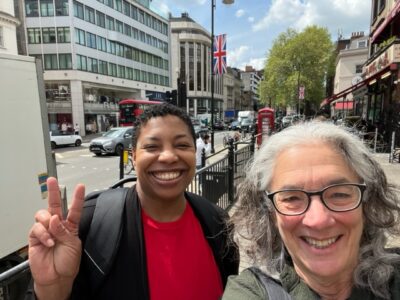
Earlier this year I joined the Board of Teach Access, an impactful non-profit organization collaborating with education, the tech industry, and disability advocacy organizations to address the critical accessibility skills gap. We haven’t had an in-person board meeting since I joined, so it was a treat to discover that Teach Access Board member Reginé Gilbert was in London for GAAD week too!
Reginé is user experience designer, an international speaker, educator, and author of Inclusive Design for a Digital World: Designing with Accessibility in Mind. We’ve been in the same virtual spaces and have spoken together often, but we’d never met in person.
The image with this section shows Reginé and me smiling on a London street corner with British flags in the background.
Back to topMore accessibility community, colleagues and friends
Today people refer to the accessibility “industry,” something far from anyone’s mind when I started in this field more than 25 years ago. And while being an industry shows growth and maturity, I hope digital accessibility remains a community too — on the local, national and global level.
Being part of that community has been invaluable to me both personally and professionally. It something I cherish.
Below are a few more images from my GAAD 2023 adventure. One that is missing is a picture of Neil Milliken, Jim Smith and me during my first lunch in London. It was great to learn more about the important work that Neil, Jim, and the Atos team are doing to advance digital accessibility globally (including a new presence in North America).
I’m especially grateful for Neil and his team for contributing lots of country-specific content for my new Global Law and Policy page. Next time (and I hope there is one) I’ll remember to take a picture!
More 2023 GAAD images:
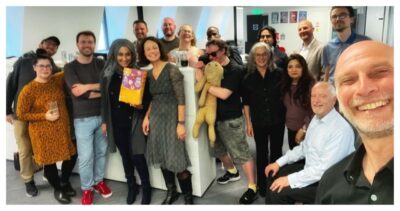
People at a social gathering hosted by AbilityNet, a UK charity focused on digital accessibility and inclusion
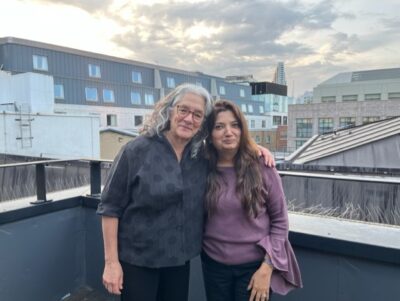
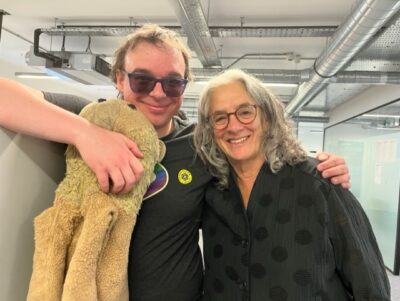
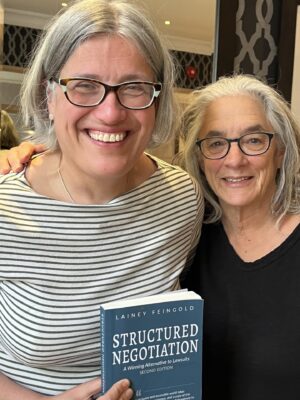
Thank you Jennison Asuncion and Joe Devon for creating GAAD in 2012 and shepherding its growth over the past decade. Thank you everyone who made my GAAD 2023 an experience I will never forget.